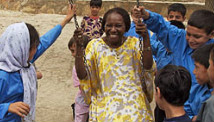By Colin Stuart, special for CNN
February 15, 2013 -- Updated 1512 GMT (2312 HKT)
STORY HIGHLIGHTS
- Meteor explosion above Russia left hundreds of people injured
- Meteor came on day asteroid expected to pass 27,000 kilometers from Earth
- Earth is sprinkled with around 170 craters also caused by debris falling from space
- Stuart says unexpected meteor shows importance of monitoring space for potential threats
Editor's note: Colin Stuart is an astronomy and science writer, who also works as a Freelance Astronomer for the Royal Observatory Greenwich in London. His first book is due to be published by Carlton Books in September 2013. Follow @skyponderer on Twitter.
London (CNN) -- Reports coming from Russia suggest that hundreds of people have been injured by a meteor falling from space. The force of the fireball, which seems to have crashed into a lake near the town of Chebarkul in the Ural Mountains, roared through the sky early on Friday morning local time, blowing out windows and damaging buildings. This comes on the same day that astronomers and news reporters alike were turning their attention to a 40 meter asteroid -- known as 2012 DA14 -- which is due for a close approach with Earth on Friday evening. The asteroid will skirt around our planet, however, missing by some 27,000 kilometers (16,777 miles). Based on early reports, there is no reason to believe the two events are connected.
Read more: Russian meteor injures hundreds

Colin Stuart
And yet it just goes to show how much space debris exists up there above our heads. It is easy to think of a serene solar system, with the eight planets quietly orbiting around the Sun and only a few moons for company. The reality is that we also share our cosmic neighborhood with millions of other, much smaller bodies: asteroids. Made of rock and metal, they range in size from a few meters across, up to the largest -- Ceres -- which is 1000 kilometers wide. They are left over rubble from the chaotic birth of our solar system around 5000 million years ago and, for the most part, are found in a "belt" between the orbits of Mars and Jupiter. But some are known to move away from this region, either due to collisions with other asteroids or the gravitational pull of a planet. And that can bring them into close proximity to the Earth.
Read more: Saving Earth from asteroids
Once a piece of space-rock enters our atmosphere, it becomes known as a meteor. Traveling through the sky at a few kilometers per second, friction with the air can cause the meteor to break up into several pieces. Eyewitnesses have described seeing a burst of light and hearing loud, thunderous noises. This, too, is due to the object tearing through the gases above our heads. If any of the fragments make it to the ground, only then are they called meteorites.
Such events are rare, but not unprecedented. An object entered Earth's atmosphere in 1908 before breaking up over Siberia. The force of the explosion laid waste to a dense area of forest covering more than 2000 square kilometers. It is not hard to imagine the devastation of such an event over a more highly populated region. The Earth is sprinkled with around 170 craters also caused by debris falling from space. The largest is found near the town of Vredefort in South Africa. The impact of a much larger asteroid -- perhaps as big as 15 kilometers across -- is famously thought to have finished off the dinosaurs 65 million years ago.
Opinion: Don't count 'doomsday asteroid' out yet
It is easy to see why, then, that astronomers are keen to discover the position and trajectory of as many asteroids as possible. That way they can work out where they are heading and when, if at all, they might pose a threat to us on Earth. It is precisely this sort of work that led to the discovery of asteroid 2012 DA14 last February by a team of Spanish astronomers. However, today's meteor strike shows that it is not currently possible to pick up everything.
A non-profit foundation, led by former NASA astronaut Ed Lu, wants to send a dedicated asteroid-hunting telescope into space that can scan the solar system for any potential threats. For now, astronomers will use Friday's fly-by to bounce radar beams off 2012 DA14's surface, hoping to learn more about its motion and structure. One day this information could be used to help move an asteroid out of an Earth-impacting orbit. This latest meteor over Russia just goes to show how important such work is and how crucial it is that we keep our eye on the sky.
Read more: NASA estimates 4,700 'potentially hazardous' asteroids
The opinions expressed in this commentary are solely those of Colin Stuart.
Part of complete coverage on
February 15, 2013 -- Updated 1421 GMT (2221 HKT)
He smashed barriers to compete in Olympics. Now police are investigating the fatal shooting of a woman at his home.
February 15, 2013 -- Updated 1756 GMT (0156 HKT)
A meteor explodes above Russia's Urals region on Friday, February 15, shattering glass in buildings and leaving hundreds of people hurt.
February 15, 2013 -- Updated 0200 GMT (1000 HKT)
CNN's Jim Clancy and Sara Sidner discuss the mysterious case of an Israeli inmate and the gag order surrounding his death.
February 15, 2013 -- Updated 0046 GMT (0846 HKT)
The number of Tibetans in China who have set themselves on fire to protest Beijing's rule has reached 100, according to Tibetan groups.
February 14, 2013 -- Updated 1517 GMT (2317 HKT)
Choosing to step down from a top job can be an extraordinary decision, whether the person is a pontiff or a politician. And it's not easy.
CNN Freedom Project: Bras command the highest price per kilogram in the used clothing market -- and provide a lifeline to rescued slaves.
February 14, 2013 -- Updated 1513 GMT (2313 HKT)
For the Rome-based press corps that follow the pope, covering the closed world of the Holy See is like attending to a nuclear missile silo.
February 13, 2013 -- Updated 2259 GMT (0659 HKT)
Becky Anderson talks to Eve Ensler about how her global campaign One Billion Rising can help end violence against women -- through dance.
February 9, 2013 -- Updated 1846 GMT (0246 HKT)
Dalal al-Ziben never thought about having another baby -- her husband has been in a prison for years. But then he had his sperm smuggled out.


















